- Home
- K. M. Ashman
The Warrior Princess Page 14
The Warrior Princess Read online
Page 14
‘Is that what you want?’
‘I don’t know what I want. I have hardly had time to breathe these past few days.’
‘You could stay here with us.’
Tarw didn’t answer and just looked down into the remains of his stew.
‘Is it such a bad suggestion?’ asked Taliesin.
‘The thought is not unpleasant to me,’ said Tarw, ‘but a few moments ago you seemed to be warning me against such a thing.’
‘It was a line of questioning only,’ replied Taliesin, ‘not a preference. Indeed, I would have thought a prince of Deheubarth belongs in the south, not amongst the halls of a blind, subservient king.’
Tarw looked up.
‘Be careful what you say, Taliesin, for he is my family, and though he is suffering the pains of extended age, he still maintains his own kingdom and an army that keeps the north free from the English fist.’
‘He is your family by marriage only,’ replied Taliesin, ‘and I repeat only what many others are already saying.’ He paused and took a drink from his jack, his gaze never leaving Tarw’s eyes.
‘What do you mean?’ asked Tarw.
‘You say he maintains a strong army, and hint that the English fear his strength, but why is it, when a fellow Welshman whose blood runs as true as his asks for aid against a common enemy, he pleads poverty and lack of resources?’
‘And you have done this?’
‘On three occasions. Twice he refused and once I did not receive a reply. Is this the mark of a strong man? I think not, Tarw. We are on our own down here and the struggle has been great, yet with Hywel ap Maredudd likely to campaign against the English then we have a great chance to rekindle the fire that once burned in the hearts of every man from here to Ceredigion. With you at my side we can rebuild those armies you speak of and once more strike fear into the hearts of the enemy. What say you, Tarw – is the sanctuary of an old man who accepts English coin so readily an attractive choice or would you rather take up your sword and tear away the yoke from the necks of our people?’
Tarw sat back and stared at the rebel leader before looking around the table at the rest of the men. Everyone was silent and all eyes lay upon him, waiting for his answer. Finally he took a deep breath and drained his jack before placing it on the table. ‘What I say is this,’ he said. ‘I agree the death of Henry presents us with an unprecedented opportunity and the thought of wielding my sword against the invader is indeed appealing, but there are a lot of things to consider before I make a decision. I will sleep on the matter and come back to you with my answer in a few days.’
‘What sort of things?’ asked Taliesin, disappointed at the reply. ‘Either you are with us or you are not?’
‘I have to discuss it with my wife and sons,’ said Tarw, ‘for they are in the front line of my thoughts and their will is paramount. In addition, I see the light of mistrust in many of the eyes around this table. If I was to seriously consider your offer, I would need to be sure I have the support of you and your men. A comrade’s back is an easy target in the heat of battle.’
‘You insult us,’ growled Taliesin, ‘for though your absence has caused anguish and heartache, there is no one who would speak against a true blood prince of Deheubarth.’
‘I would,’ said a voice and all eyes turned to Tomas Scar. The warrior was staring down into his jack and it was obvious he had already drunk too much ale. Silence fell and eventually he looked up, his gaze passing between Tarw and Taliesin.
‘You two make me sick,’ he said eventually.
One of the men at Taliesin’s side made to stand up, his hand going to his blade, but the rebel leader pulled him back onto the bench.
‘Let him be,’ said Taliesin. ‘I value the word of every man in this tent. Our comrade will have his say and we will listen.’ He turned to Tomas. ‘Say your piece, my friend, but I hope you know what you are doing.’
‘I will,’ said Tomas, ‘because if this man is really who he says he is, then you have invited a coward and a traitor into our midst. A man who ran like a scared child as soon as the Crown set a price upon his head. Is that the sort of leader we want, one who runs as soon as his skin is at risk?’
‘It wasn’t like that,’ said Tarw quietly.
‘Then what was it like, Tarw?’ shouted Tomas, slamming his jack down onto the table. ‘Because from here that is exactly what it looks like. Tell these men why it is that while they continued the fight against the English, often seeing comrades dangle at the end of a hangman’s noose, you were lording it up at Llandeilo with a warm bed and a full belly. Explain to them why you ran like a scared child and if they offer understanding perhaps then and only then can you even dream we will accept you as one of our own.’
‘He is the prince of our kingdom,’ said one of the men behind Tarw, ‘and does not answer to you or anyone else.’
‘Yes I do,’ said Tarw quietly. ‘The man is right and even if our paths separate on the morrow, these men still deserve an explanation.’
‘Then spit it out, Prince,’ said Tomas with a sneer, ‘for I am in need of light-hearted entertainment.’
‘The truth is,’ said Tarw, ‘you are right, I did leave the rebellion without warning and I admit there was an element of selfishness in my decision, but it was not for myself, it was for my family. The king had put a price on my head and on that of my wife. While that was nothing new, he extended it to my sons and made it known it would be paid for any one of us, man, woman or child, dead or alive. Of course I had to consider their safety for, though Gwenllian and I had embraced the life of a rebel, they were innocent in all this.’
‘So what is the difference between your children and ours?’ asked Tomas. ‘Are ours not also deserving of a warm bed and the chance to live in peace?’
‘Of course,’ said Tarw, ‘and therein lies my point. Henry sent a message offering me and my family a total amnesty if we laid down our weapons and submitted to him the names of everyone involved in the rebellion. If we refused, he vowed to invade Deheubarth and burn every village to the ground, slaughtering man or beast without mercy. All land would be confiscated and awarded to his Flemish-born knights, men of renowned cruelty, and anyone left alive would be enslaved to the new landholders.’
‘And you believed him?’
‘I had no option,’ snapped Tarw, his voice raising in frustration. ‘The letter was signed and sealed by his own hand and if I had ignored it, I would have been responsible for hundreds of deaths, perhaps thousands. It would certainly have meant the end of Deheubarth as a kingdom.’
‘We face such threats on a daily basis,’ said another voice.
‘I know,’ said Tarw, turning around, ‘but this was different. This time he was targeting the innocent. You men chose the burden of rebellion and all the risks that go with it, as did I, but those people out there who scratch in the earth every day for a mouthful of food did not. I had no choice and had to negotiate.’
‘What did you do?’ asked Taliesin.
‘I refused to give the names of my fellow rebels,’ said Tarw, ‘but instead offered to disappear along with my family if Henry withdrew his threat. Negotiations were long and drawn out but eventually he agreed as long as he had my word that I would never again lead a rebellion in his or my lifetime. We agreed terms and when the document was signed, Gwenllian and I, along with my children left the Cantref Mawr and headed into obscurity.’
‘Hardly obscurity,’ said Tomas. ‘More like the life of luxury.’
‘The Lord of Llandeilo is an old family friend,’ said Tarw, ‘and he offered us sanctuary at his manor. Nobody knew our true identity there, so we remained and I took up the position of steward. That is where we remained for many years until a few days ago when circumstances dragged us from our shelter and forced us once more to face reality.’
‘So do you still harbour resentment against the Crown?’
‘With every fibre of my being,’ said Tarw. ‘And if it wasn’t for my vow, I would join
you in an instant.’
‘But the king is dead,’ said Tomas. ‘Why withhold your sword arm if your resentment still burns?’
‘My vow was to last as long as he or I still lived,’ said Tarw. ‘Henry may have died but I have not.’
‘So what? He would know no difference.’
‘I would and no man is better than his word.’ He turned to Taliesin. ‘So, now you know. Yes, I fled the Cantref Mawr but the reasons were sound and though I freely admit to protecting my family, there were other things to consider.’
‘We needed you,’ shouted Tomas Scar, getting to his feet and throwing his jack across the tent.
‘My family needed me,’ roared Tarw in response, getting to his own feet, ‘and if that is such a crime then strike me down now for I have no regrets. If I had not done what I did, we would all now be in our graves including you. As it is Deheubarth still stands and with the English king dead, it yet has a chance to stand again.’
‘Enough!’ shouted Taliesin, getting to his feet. ‘We are going around in circles. Tomas, you assume I have already made up my mind in this matter but nothing could be further from the truth. Yes, I am as frustrated as you about this man’s absence but I owe it to everyone to hear all sides of the story. I suggest you go back to your hut and sleep off the ale before something is said we all may regret.’ He turned to Tarw. ‘You may be a prince, but you forfeited the right to lead these men when you left. I cannot deny that your desertion leaves me with a great feeling of unease. However, these are unique times and with the king dead there may be an opportunity to renew our struggle. I will consider your explanation overnight and we will meet again in a few days. Until then, you will remain in the camp under armed guard. Understood?’
‘Aye,’ said Tarw.
‘Good, now everyone be gone.’
Kidwelly Castle
December 23rd, AD 1135
Lord Maurice de Londres, castellan of Kidwelly castle, stood atop the palisade watching the approaching column of knights. He had received word the previous day that Gerald of Windsor would be coming, and though he was preoccupied with preparations to attend London for the funeral of the king, he knew that, for Gerald to come himself, it had to be important. The winter wind whistled around his bald head while blowing his long beard against his mail-covered barrel-like chest. Though a small man, Maurice’s reputation was huge and what he lacked in stature he made up for in aggression and ability. He was fiercely loyal to the Crown and hated the Welsh with a vengeance. Despite this, he had immediately accepted the posting as castellan of Kidwelly castle the moment the king had suggested it a few years earlier. Now that Henry was dead he couldn’t help wondering what other opportunities might arise under the reign of the new monarch, whoever that might turn out to be.
His deep-set eyes stared at the scene outside the castle walls. Kidwelly town lay less than a few hundred paces distant across the river, and though it was largely peaceful, his men were forbidden from enjoying the few taverns in the town due to the risk of assault from the more patriotic of the locals.
Outside the palisade, fifty of Maurice’s best men lined the track as a welcoming guard and the castellan nodded to Gerald in acknowledgement as the visitor passed through the gateway below. When everyone was inside, the giant gates closed and Maurice descended to greet his fellow knight.
‘Sir Gerald,’ he said, walking over. ‘I trust you had a good journey?’
‘As well as can be expected,’ said Gerald. ‘We came via Carmarthen, though stayed just the one night.’
‘Was not the hospitality to your liking?’
‘On the contrary, they were very welcoming but the main purpose of my journey is to meet with you.’
‘I am intrigued,’ said Maurice, ‘and look forward to hearing what you have to say, but first you must accompany me to the hall to meet my wife.’
Gerald looked around at the rest of his men.
‘You can trust they will be well catered for,’ said Maurice, seeing his look of concern, ‘both man and beast. Come, Marion is waiting.’
Gerald followed Maurice up the steps of the motte and into the lesser hall of the keep. Inside, a beautiful young woman was standing alongside an inviting fire. Her fiery red hair hung down to her waist, matching the silken dress that was clinging to her like a second skin.
‘My Lord Gerald,’ said Maurice, ‘allow me to introduce my lady wife, Marion of Cork.’
‘I am honoured,’ said Gerald, taking the lady’s hand and bowing gently. ‘The rumours of your beauty were not unwarranted.’
‘Thank you, my lord,’ said Marion, ‘but it is I who am honoured. Your reputation precedes you and we are lucky to have your influence in this dangerous country. Please, approach the fire and get some warmth back into your bones.’ She looked over his shoulder. ‘Is not the Lady Nesta with you?’
‘Alas, not this time. This a visit of business, not pleasure. Your husband and I have matters of great importance to discuss over the next few hours.’
‘Of course,’ said Marion, ‘and I will leave you to the business of men, but tonight we will dine in your honour. Please say you will accommodate us.’
Gerald smiled. ‘Of course,’ he said. ‘Again, I am honoured.’
Marion smiled back and turned to one of her servants. ‘Instruct the kitchens that we will eat at dusk,’ she said, ‘and ensure the best wine is served throughout the evening.’
The maid curtsied and went about her tasks as Marion turned back to face Gerald.
‘My husband will show you to your quarters where there is hot water waiting for you as well as clean linen with which to wash the road from your skin. I look forward to hearing all about your daring exploits amongst the natives of this God forsaken land later but, in the meantime, please make yourself at home.’
‘Thank you, my lady,’ said Gerald.
Marion smiled at the two men and left the hall.
When they were alone, Gerald said, ‘It has been a long time, my friend.’
‘Too long,’ said Maurice, walking over to the silver decanter on a nearby table. ‘Is the Welsh winter treating you well?’
‘I have been here for many years, Maurice,’ said Gerald as he joined him by the fire, ‘and I am used to anything it throws at me.’
‘I wish I could say the same,’ replied Maurice, offering Gerald a goblet, ‘but alas the winds cut into my very bones like the sharpest blade.’
Gerald took the goblet and his eyes widened in admiration. It was made of solid silver and finely decorated with a detailed hunting scene.
‘A fine goblet,’ he said, turning it around in his hand. ‘Did you have them made?’
‘No, we confiscated them from a chapel down near the coast. Apparently they were a gift to the clergy from a local Welsh lord when his wife died. A sort of thank you for the ceremony, I suppose.’
‘And you saw fit to take them?’
‘The priest was a drunkard and a womaniser,’ said Maurice with a sigh. ‘He was no more pious than my horse, and after my constable was called out to deal with the results of his drunken temper for the third time in a week, I decided he should pay for the privilege. Any coins he had hidden in his church, and there were quite a few, we gave to his victims’ families while the rest of his possessions we took as payment, including these goblets.’
‘Where is he now?’
‘I know not,’ said Maurice. ‘I had him thrown out and burned the hovel he called his church.’ He took a swig of his wine before continuing. ‘Anyway, you haven’t come all the way down here to discuss some drunken varlet.’
‘I only wish it was that simple,’ said Gerald. ‘But you are right, my reasons for coming are of a far more serious nature.’
Maurice nodded towards the two comfortable seats near the fire. ‘Come, we have a few hours before Marion’s obligatory hospitality. Let us talk while we have some privacy and tonight we can relax.’
Gerald sank into one of the chairs opposite Maurice and leaned fo
rward to place his ornate goblet on the table. ‘The problem is this,’ he said eventually, ‘I am getting very worried about the mood in Deheubarth. There is an up-swelling of anger amongst the population and our gaols are full of those found guilty of conspiracy as they wait to be executed. On top of that, there is a definite increase in the number of attacks on our supply columns, many from brigand groups previously unknown.’
‘Surely a few brigands do not unduly worry you?’
‘Ordinarily no, but their numbers are increasing across the kingdom and I worry that they may join together in common purpose.’
‘Highly unlikely, I would have thought,’ said Maurice. ‘It is one thing to feed a handful of brigands with a stolen pig but quite another to feed an army of any size. Besides, who would lead such a group?’
‘Well, that’s the thing,’ said Gerald. ‘There is a chance that Gruffydd ap Rhys yet lives, as well as his wife, Gwenllian.’
Maurice paused with his goblet halfway to his lips. ‘Tarw is alive?’ he gasped. ‘But that is impossible.’
‘Apparently not. It seems his death may have been a ruse and he has hidden himself away these past few years. Recently he has had cause to break his cover, and though he has again disappeared from sight, my spies tell me he has joined with the rebels in the Cantref Mawr. If this is true, I am concerned that all those brigands we just talked about could unite under his banner.’
‘And you really think that is possible?’
‘I don’t know,’ said Gerald. ‘But what I do know is that we should not take the risk lightly. The mood amongst the people is ripe for a new cause and already we are finding it harder and harder to fill our food stores.’
‘What do you mean?’
‘It seems that, all of a sudden, those farmers who once begged to sell their produce within the palisades of our castles now have less livestock to sell. The rumours are that any spare is being diverted into the Cantref Mawr to feed the rebel camps. Consequently we are increasingly reliant on supply caravans from Carmarthen and beyond.’

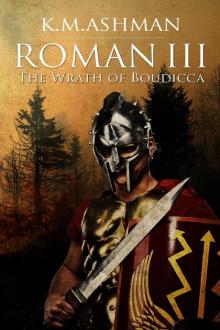 The Wrath of Boudicca
The Wrath of Boudicca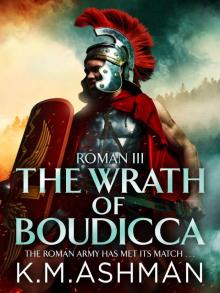 The Rise of Caratacus
The Rise of Caratacus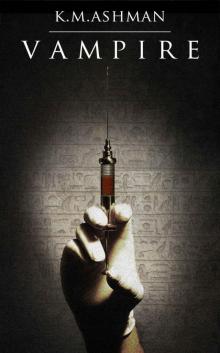 Vampire
Vampire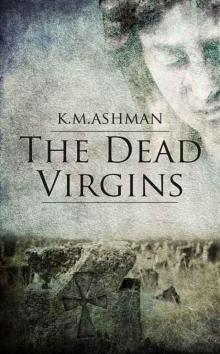 The Dead Virgins (The India Sommers Mysteries Book 1)
The Dead Virgins (The India Sommers Mysteries Book 1)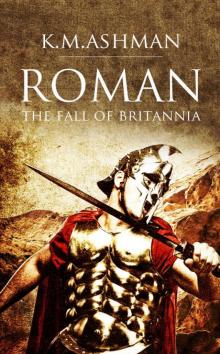 Roman - The Fall of Britannia
Roman - The Fall of Britannia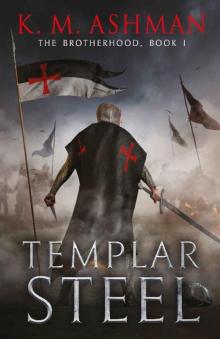 Templar Steel
Templar Steel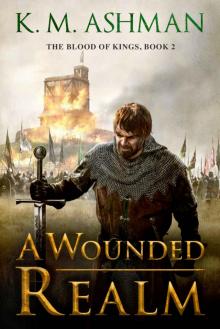 A Wounded Realm
A Wounded Realm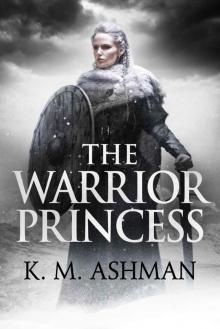 The Warrior Princess
The Warrior Princess